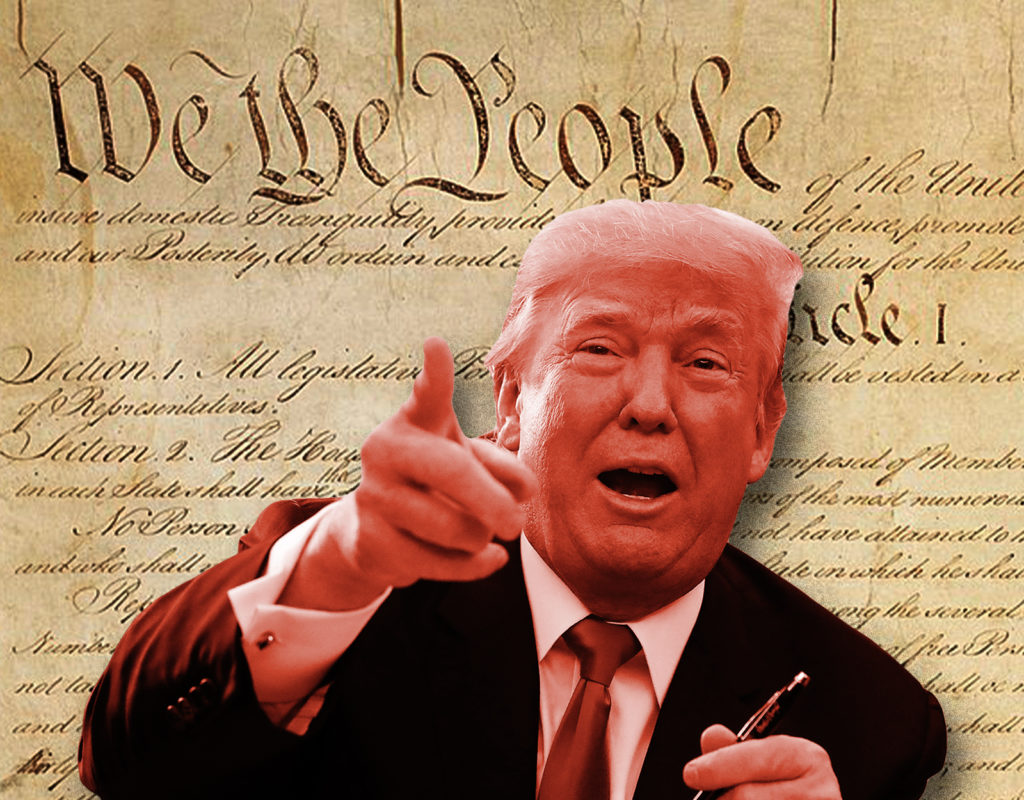Bragg violated Trump’s 6th Amendment rights in refusing to disclose underlying crime: legal expert
The Sixth Amendment guarantees defendants will be ‘informed of the nature and cause of the accusation’
Only feds can prosecute fed crimes any tying to fed crimes don’t hold water. also that would make any misdemeanor fraud non attachable to a federal crime hence no indictment
Does Bragg’s indictment violate Trump’s Sixth Amendment rights! Gregg Jarrett and panel
In Trump Case, The Former President’s Right to an Impartial Jury does not exist in New York City
The Sixth Amendment provides that “in all criminal prosecutions, the accused shall enjoy the right to a speedy and public trial, by an impartial jury.”
Gregg Jarrett, Charlie Hurt and Tammy Bruce sound off on ‘Hannity’ after former President Donald Trump was indicted in New York.
Former President Donald Trump’s Sixth Amendment rights may have been violated when New York County District Attorney Alvin Bragg refused to disclose the underlying crime the defendant intended to conceal through his alleged falsification of business records, legal experts opined Wednesday.
The Sixth Amendment provides in part for the right of a criminal defendant to “be informed of the nature and cause of the accusation; to be confronted with the witnesses against him; to have compulsory process for obtaining witnesses in his favor…”
When questioned by a reporter as to what the underlying crime the indictment fails to name is, Bragg replied in New York State, he does not have to.
“The indictment doesn’t specify it because the law does not so require,” he told the journalist.
BRAGG SHOULD BE DISBARRED: LEVIN
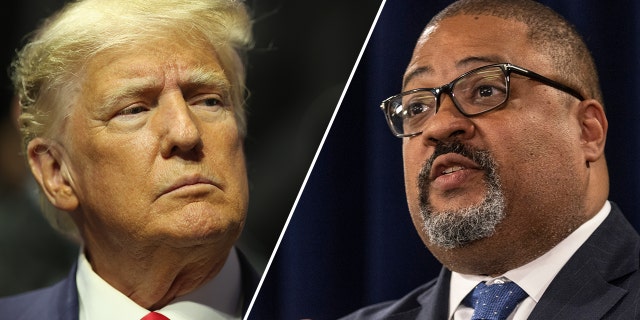
Former President Donald Trump, left, and Manhattan District Attorney Alvin Bragg. (Shane Bevel/NCAA Photos via Getty Images | Victor J. Blue/Bloomberg via Getty Images)
On “Hannity,” Fox News legal analyst Gregg Jarrett forcefully dismissed Bragg’s claim, saying he likely violated Trump’s right to know what he is specifically being accused of.
“He does [have to name it, via] the Sixth Amendment,” Jarrett said. “[The indictment] is therefore facially defective. It is deficient on its face and it would be susceptible to a motion-to-dismiss.”
Jarrett questioned whether Bragg slept through constitutional law in his studies at Harvard, envisioning the prosecutor working late one evening in New York City, mumbling that “I’ve got to get Trump — What crime? — What crime?” and that an office worker simply remarked, “Don’t say anything.”
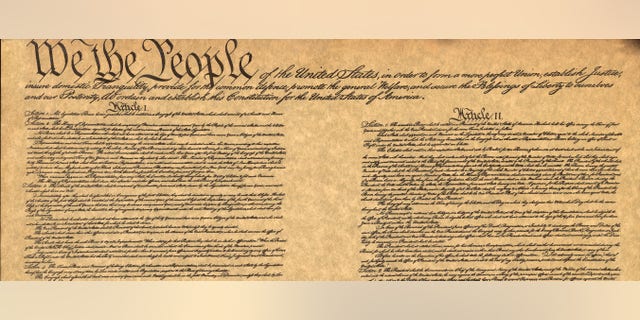
Facsimile of the U.S. Constitution. (Fotosearch/Getty Images)
Jarrett recalled a warning from former Supreme Court Justice Robert H. Jackson, a Nuremberg Trial prosecutor, who said the “greatest danger to justice is an unscrupulous prosecutor who targets a person and then scours the law books to find an offense he can pin on that person.”
“That’s what Alvin Bragg has done,” he said.
Washington Times editor Charlie Hurt later added incredulously that Bragg’s charges amount to potentially more prison time — 136 years — than infamous Ponzi schemer Bernard Madoff, who died at a Butner, North Carolina, prison in 2021, served.
“[T]his is such a circus — it’s so absurd. It’s so ridiculous. Alvin Bragg has so embarrassed himself, embarrassed to the legal profession that it really is going to, I think, set the tone for anything else any of these wacko, crazed, lunatic, left-wing, politicized Democrat DA’s want to do to try to destroy Trump,” Hurt said.
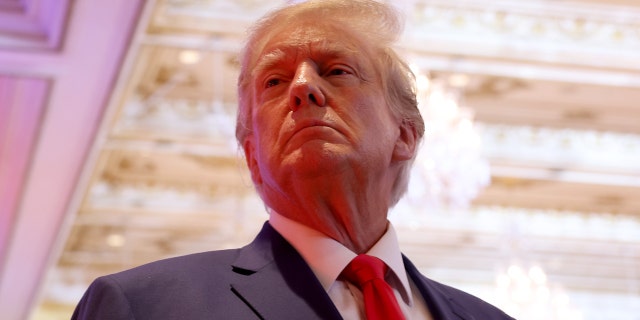
Former President Donald Trump. (Joe Raedle/Getty Images)
Another Democratic prosecutor investigating Trump is Fulton County, Georgia’s Fani Willis. The case in the largest of a handful of counties the city of Atlanta comprises centers on allegations Trump violated the law when he asked Georgia Secretary of State Bradford Raffensperger to “find” a number of votes equal to what he needed to win the Peach State.
Trump is also under special counsel investigation after Attorney General Merrick Garland named now-former Kosovo War crimes prosecutor John “Jack” Smith to probe the discovery of classified documents at the former president’s Palm Beach home.
Trump also faces a civil suit in New York City from advice columnist E. Jean Carroll, who alleged the then-mogul sexually assaulted her at Bergdorf Goodman sometime in either 1995 or 1996.
In a January deposition transcript, Trump denied the incident, saying, “[Carroll] said I did something to her that never took place. There was no anything. I know nothing about this nut job.”
The Trump Indictment Is a Legal Embarrassment
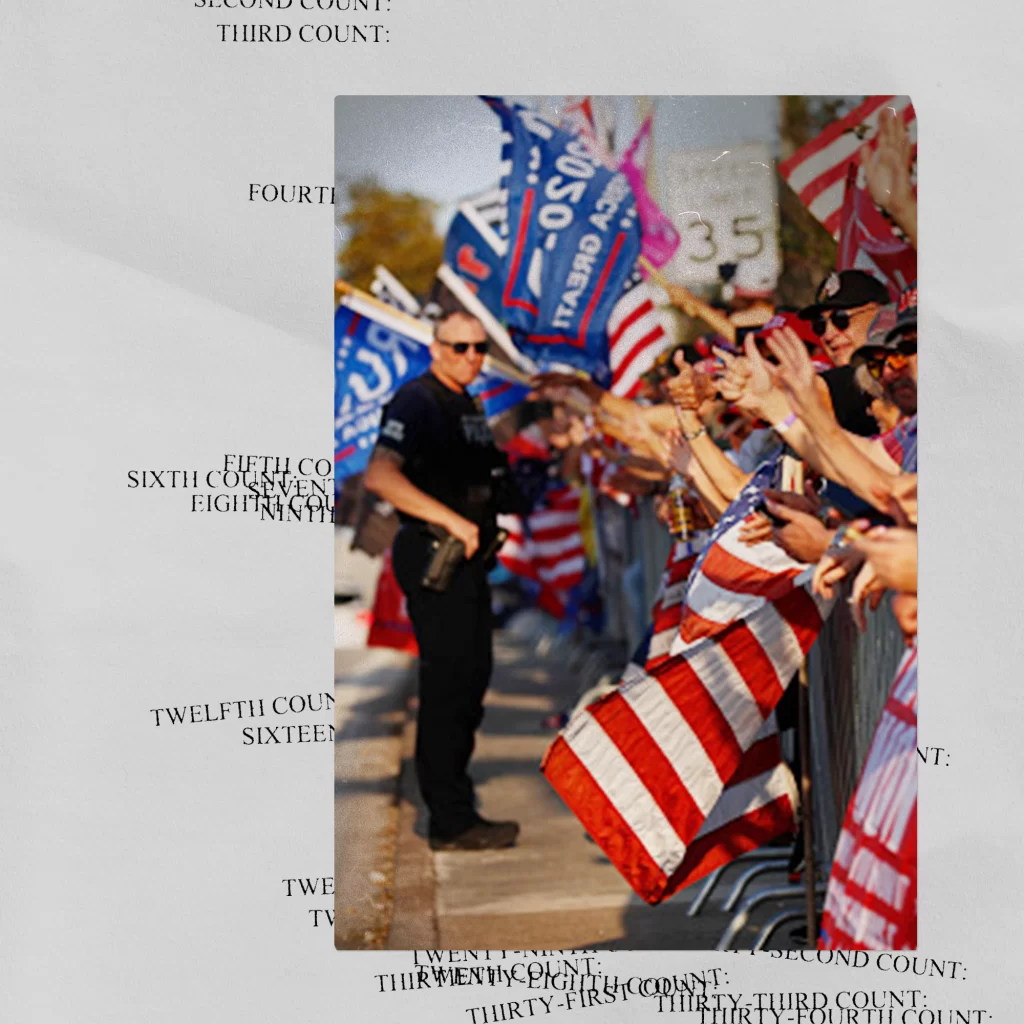
Mr. Shugerman is a law professor at Fordham and Boston University.
Tuesday was historic for the rule of law in America, but not in the way Alvin Bragg, the Manhattan district attorney, would have imagined. The 34-count indictment — which more accurately could be described as 34 half-indictments — was a disaster. It was a setback for the rule of law and established a dangerous precedent for prosecutors.
This legal embarrassment reveals new layers of Trumpian damage to the legal foundations of the United States: Mr. Trump’s opponents react to his provocations and norms violations by escalating and accelerating the erosion of legal norms.
The case appears so weak on its legal and jurisdictional basis that a state judge might dismiss the case and mitigate that damage. More likely, the case is headed to federal court for a year, where it could lose on the grounds of federal pre-emption — only federal courts have jurisdiction over campaign finance and filing requirements. Even if it survives a challenge that could reach the Supreme Court, a trial would most likely not start until at least mid-2024, possibly even after the 2024 election.
Instead of the rule of law, it would be the rule of the circus.
Let’s start with the obvious problem that the payments at issue were made around six years ago. The basic facts have been public for five years. There are undoubtedly complicated political reasons for the delay, but regardless, Mr. Bragg’s predecessor, Cyrus Vance Jr., had almost a year to bring this case after Mr. Trump left office, but did not do so, and Attorney General Merrick Garland’s Justice Department also declined. To address the perception of a reversal and questions of legitimacy, Mr. Bragg had a duty to explain more about the case and its legal basis in what’s known as a “speaking indictment,” which the team of the former special counsel Robert Mueller made famous in its filings.
Legal experts have been speculating about the core criminal allegation in this case, because the expected charge for “falsifying business records” becomes a felony only “when his intent to defraud includes an intent to commit another crime or to aid or conceal the commission thereof.”
Astonishingly, the district attorney’s filings do not make clear the core crime that would turn a filing misdemeanor into a felony. Neither the 16-page indictment nor the accompanying statement of facts specifies, though the statement of facts does drop hints about campaign laws. In a news conference, Mr. Bragg answered that he did not specify because he was not required to by law. His answer was oblivious to how law requires more than doing the minimum to the letter — it demands fairness, giving notice and taking public legitimacy seriously.
As a result of all this, Mr. Trump and the public still know shockingly little about the case — not which particular statute he allegedly violated nor whether it is a state or federal campaign crime, a tax crime or something else. That’s why the indictment really contains only 34 half-counts. This open-ended indictment reflects a rule that jurors don’t have to agree on which underlying crime was committed, only that there had been an underlying crime, yet it is also standard when charging some cases to specify “crimes in the alternative.”
Giving only partial notice might be standard operating procedure in Manhattan, but that standard procedure — suddenly in the bright lights — seems like a systemic infringement of a New Yorker’s right to know “the nature of the charges and evidence against you,” a normalized Sixth Amendment violation. On the bright side, maybe the backlash will force Manhattan prosecutors to end this general practice. Still, it is hard not to ask whether Mr. Trump was actually treated worse than other similarly situated defendants, because after so many years of delay, surely a Manhattan prosecutor would have informed another defendant of at least the basic underlying crimes and their statutory basis.
The public could be forgiven for imagining that Mr. Bragg has not settled on his own theory. Unfortunately, he has given fodder to those who would portray this case as a political prosecution still in search of a legal theory.
Even based on the half-felony that we do know — the false business filing with “intent to defraud” — it remains unclear whether a court has ever allowed a false-filing conviction based on an entirely internal business record that no other party, like a bank, insurance company or customer, would have relied on. I am yet to see any legal experts who have argued for this statute as a basis for the case against Mr. Trump who has identified a New York case along these lines.
Nor have I found one in my own research. That hole in the case should have given prosecutors pause: What, in practice, is the meaning of “intent to defraud”? If a business record is internal, it is not obvious how a false filing could play a role in defrauding if other entities likely would not rely upon it and be deceived by it. Even if one can argue that the statute should apply to internal records, this is not the ideal time to test a seemingly novel (or even a very rare) application.
Because of pre-emption, it’s entirely possible that the State of New York cannot prosecute a state case based on a federal election filing violation. The underlying crime, as best as we can tell from Mr. Bragg’s news conference and a statement to the press, is a campaign finance violation — spending money for a campaign cover-up without reporting it. However, for a federal election, there is what one might call “double pre-emption” or “confirmed pre-emption”: Both Congress and the State of New York agree that cases about federal campaign filings are for federal courts only, not for states.
The Federal Election Campaign Act has a broad pre-emption clause: “The provisions of this act, and of rules prescribed under this act, supersede and pre-empt any provision of state law with respect to election to federal office.” New York State law confirms that state “filing requirements and the expenditure, contribution and receipt limits” under state law “shall not apply” if there is a federal requirement and a federal filing (in other words, they don’t apply to federal elections).
Federal pre-emption applies most strongly when the subject is the candidate’s own campaign conduct (as opposed to donors’, for example) and when it relates to core issues like filing rules (as in this case against Mr. Trump). Some defenders of the indictment cited some examples of federal courts allowing states to proceed based on state law, but those cases were not about basic campaign filing rules but about a fund-raiser funneling money to his own for-profit business, or they were about rules for donors’ contributions or political action committees, as opposed to the candidates’ conduct. These legal experts did not specify any case allowing a state to prosecute a candidate for his or her own behavior in a core area of campaign regulation like filing requirements.
Federal courts allow for states to regulate the “times, places and manner” of elections, voter registration, ballot theft and the like. They allow exceptions for pre-emption when the state laws are “more tangential to the regulation of federal elections.” This state filing law is not tangential to federal campaign filing law, nor is this allegation tangential to the field of federal campaign law. But federal courts have emphasized that the federal law applies most strongly to candidate behavior, especially on filing questions. The application of this state filing law overlaps much more closely with the federal law’s field of campaign finance and filing.
There is good reason for pre-emption for federal campaign finance: the danger of local prosecutors bending state law against federal candidates of the opposing party. Congress and New York have traditionally agreed that federal campaign finance and filing law are for federal courts.
Pre-emption, abstention and federal jurisdiction are complicated. Even if there is a valid argument that somehow the state statute and this case are only tangential to federal election law or that federal courts should abstain from taking it, Mr. Trump’s lawyers still can go back to the game book from their tangle with the previous Manhattan district attorney, Trump v. Vance, and the subpoena for tax returns. Mr. Trump’s lawyers filed for an injunction in federal trial court, took the appeals up to the Supreme Court and delayed the subpoena for about a year. This case is headed up the same road. The Supreme Court has ruled in favor of federal pre-emption in cases with less clear pre-emption language, and Mr. Trump has a substantial chance of winning, given the clarity of the federal pre-emption language and confirmation of pre-emption in New York State law.
Even if Mr. Bragg prevails, would a trial eight or more years after the underlying events, either at the height of the 2024 election or soon after, really be a win for the rule of law?
Perhaps Tuesday was really an indictment of the Department of Justice under William Barr and Merrick Garland. If anyone should have brought this case, it was one of them. And if the Garland Justice Department should bring a case, there are stronger, more recent and much more serious charges to bring. source
Jed Handelsman Shugerman (@jedshug) is a law professor at Fordham and Boston University.

